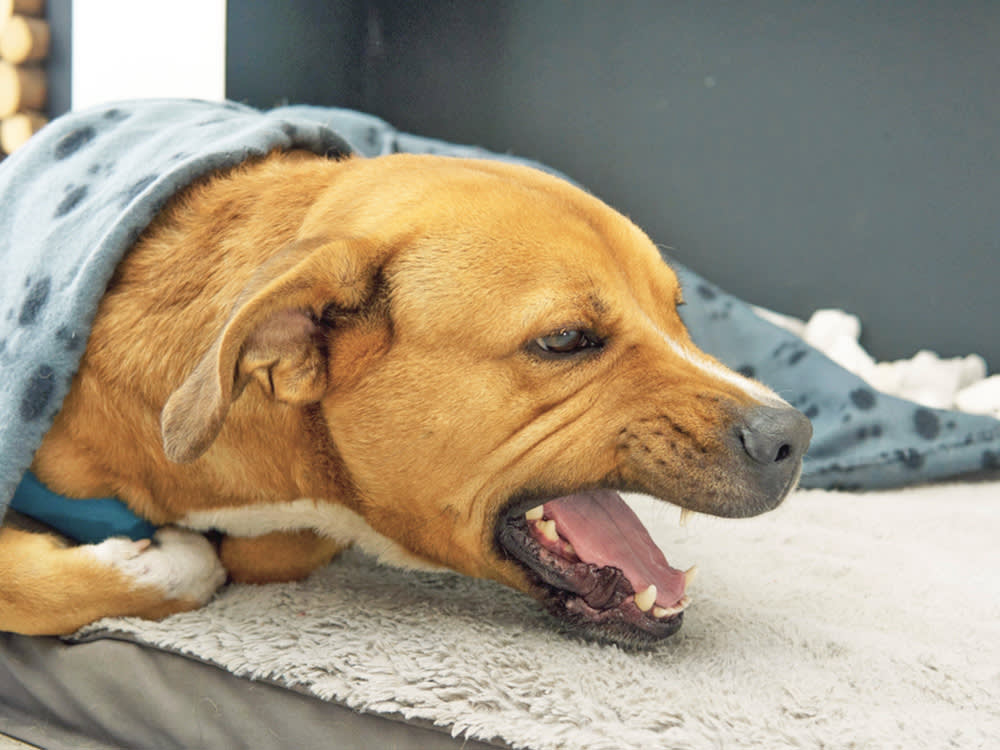Why Is My Dog Coughing? Common Causes for a Cough
That sounds unpleasant...

Share Article
In This Article:
Types of Dog Coughingopens in a new tab Common Causes of Dog Coughingopens in a new tab When Should I Take My Dog To The Vet for Coughing?opens in a new tab
We all cough from time to time, and dogs are no different. Coughing is a natural reflex to clear irritants from the airway, and the occasional cough is completely normal. However, a pup with a persistent cough may lead their parents to ask, “Why is my dog coughing and hacking all the time?”
Dog coughs can vary widely — they can be dry or wet, soft or honking, minor or concerning. A cough can be an intentional action to clear something from the airway or a reflex triggered by irritation or inflammation within the respiratory tract.

littleKin™ is Kinship’s home just for puppy and kitten parents. Bop over to check out expert advice, new pet tools, and special deals—all curated for your newest family member.
opens in a new tabUnderlying causes for dog coughingopens in a new tab can originate from the upper airway to deep within the lungs. Dogs can cough after drinking water too quickly or from excitement (we’ve all choked on our own spit before). Coughing can also result from external irritants like dust or more serious conditions such as pneumonia or cancer.
The occasional hack shouldn’t raise alarm bells. However, persistent coughing may be a sign of a serious health issue, especially if your dog has additional symptoms.
Types of dog coughing
Coughing in dogs can have different sounds and characteristics depending on the underlying cause. Determining which type of cough your dog has can help you and your veterinarian identify potential causes. Here are common types of coughing in dogs:
Dry, hacking cough
A dry, hacking cough in dogs can sound like constant, subtle throat clearing. This type of cough is seen with tracheal irritation, which is often caused by canine infectious respiratory disease complex (kennel cough).
Honking or goose-like cough
A deep, harsh, honking cough in dogs is often described as sounding like a goose. This type of cough is usually caused by conditions affecting the trachea like tracheal collapse or kennel cough.
Gagging or retching cough
A dog’s gagging cough can be accompanied by retching. It can look as if a dog is trying to vomit as they try to clear their airway and is often caused by airway irritants.
Wet or productive cough
A wet, phlegmy, gurgling cough in dogs is often a sign of fluid or mucus buildup in the lungs. This type of cough can be a sign of pneumonia or bronchitis. Although this phlegmy cough is typically as productive as it sounds, pet parents rarely see their dog actually produce any actual phlegm or mucus. So if you’re wondering to yourself, My dog keeps coughing and gagging but nothing comes out — why?, it’s because your dog usually swallows whatever they cough up before you can see it.
Cough with white foam production
Dog coughing that ends with the production of white, frothy fluid can have multiple underlying causes including kennel cough, pneumonia, heart disease, and gastrointestinal reflux.
Common causes of dog coughing
Coughing in dogs can have many causes, ranging from mild irritations to serious health issues. Paying attention to what triggers your dog’s cough — such as exercise, excitement, or eating — can provide valuable clues about the underlying problem. Understanding the potential causes can help you determine when it’s time to seek veterinary care. If your dog's cough is ongoing or if they have symptoms in addition to a cough, never hesitate to contact a vet to figure out next steps.
Kennel cough
Canine infectious respiratory disease complexopens in a new tab (CIRDC), commonly called kennel coughopens in a new tab, is a contagious respiratory infection in dogs that is often spread in multi-dog environments like shelters, dog parks, and boarding facilities.
CIRDC is caused by one or more of a long list of bacterial or viral organisms, and it typically causes a dry, hacking, unproductive cough in dogs. For many dogs, coughing is the only symptom they develop, though kennel cough can progress and cause lethargy, inappetence, and pneumonia. Treatment for kennel cough in dogs depends on the severity of a dog’s illness, but most dogs recover with rest and isolationopens in a new tab from other dogs.
Canine influenza
Canine influenza, or dog fluopens in a new tab, is a contagious respiratory infection caused by specific subtypes of the influenza A virus. The virus is one of the many pathogens known to contribute to canine infectious respiratory disease complex, or kennel cough. Like kennel cough, dog flu is typically spread in environments where dogs gather, like shelters, doggie daycares, dog parks, dog shows, and pet stores. Dogs with canine influenza typically develop a dry, hacking cough, nasal discharge, sneezing, and lethargy.
Tracheal collapse
Tracheal collapse is a common cause of a deep, honking cough in dogs. The trachea (windpipe) is made of several C-shaped rings of cartilage. In dogs with tracheal collapse, the cartilage weakens and flattens, causing irritation and coughing. Coughing fits can be triggered by exercise or excitement.
Tracheal collapse is most commonly diagnosed in small and toy breed dogs, with Yorkshire Terriers and Pomeranians being the most frequently affected breeds. The condition is chronic and progressive, and it is typically managed through a combination of medication, weight management, stress reduction, and avoiding neck leads. In some cases, surgery to insert stents that keep the trachea open may be an option, though this is not suitable for every dog.
Heart disease
Heart disease in dogs comes in many forms, but the most common type, and the one most likely to cause coughing, is myxomatous mitral valve disease. This condition occurs when there is abnormal flowopens in a new tab of blood through the heart valves, causing fluid to build up in the lungs. This fluid buildup can progress to congestive heart failure, which causes an increased respiratory rate and effort and a persistent cough when severe. The cough may be soft or include gagging and small amounts of foam. Mitral valve disease also causes the heart to become enlarged, and in severe cases, the heart is so large that it presses on the large airways, triggering additional coughing.
Emergency treatment for congestive heart failure typically includes supplemental oxygen and medications. Long-term management includes medications, weight management, and restricted salt intake.
Heartworm disease
Heartworms (Dirofilaria immitis) are parasitic worms opens in a new tabthat are transmitted to dogs via mosquito bites. Heartworms live in the heart, lungs, and blood vessels, and cause inflammation. Early on in an infection, dogs may not have any symptoms, but as the infection progresses, dogs develop a dry, persistent cough. Signs of heartworm disease in dogs can also include exercise intolerance, weight loss, and lethargy.
Treating heartworm disease is a multi-step process that includes medication, strict activity restriction, and follow-up testing. Heartworm disease is most prevalent in the southeastern parts of the United States, but all dogs are susceptible and should be on monthly preventativesopens in a new tab.
Allergies
Allergic bronchitis in dogs occurs when allergens enter the airways via inhalation or blood stream can trigger an immune response and inflammation in dogs. This inflammation causes mucus production to increase and small airways to constrict, leading to coughing and wheezing. Common irritants include dust, aerosol sprays, smoke, and parasites.
Pneumonia
Pneumonia is an infection of the lungs and tends to cause a wet, productive cough. Dogs can develop pneumonia from bacterial or fungal infection or after accidental aspiration (fluid going down the wrong tube).
Dogs with pneumonia often feel sick and have additional symptoms like lethargy, fever, and changes to their breathing pattern. Treatment for pneumonia in dogs involves antibiotics and supportive care, which may include supplemental oxygen.
Cancer
Cancer can affect a dog’s respiratory system by causing a tumor in the respiratory tract or, in cases of metastatic disease, by spreading to the lungs. The type of cough seen with cancer in dogs depends on how the disease is affecting their airway but may be accompanied by other symptoms such as labored breathingopens in a new tab, lethargy, and weight loss.
When should I take my dog to the vet for coughing?
If your dog is coughing, the best course of action is to contact your vet. Many causes of coughing in dogs are treatable, and they are best treated before they become a life-threatening respiratory emergency.
Be sure to inform the veterinary staff if your dog is potentially contagious so that they can take precautions to prevent spread of infectious respiratory disease to other dogs. Even if you’re not sure if your pup is contagious, let them know if your dog was recently at a boarding facility or adopted from a shelter so that they can determine the risk to other dogs.
Get your pup to a veterinary hospital ASAP if you notice these signs:
Labored or difficulty breathing
Pale or blueish gums
Coughing up blood
Weakness
Collapse
References
“Canine Infectious Respiratory Disease Complex (Kennel Cough).” American Veterinary Medical Association, www.avma.org/resources-tools/pet-owners/petcare/canine-infectious-respiratory-disease-complex-kennel-coughopens in a new tab.
CDC. “About Dog Flu.” Influenza in Animals, 2024, www.cdc.gov/flu-in-animals/about/canine-flu.htmlopens in a new tab.
Hsieh, Brisa M., and Alicia K. Beets. “Coughing in Small Animal Patients.” Frontiers in Veterinary Science, vol. 6, 21 Jan. 2020, www.ncbi.nlm.nih.gov/pmc/articles/PMC6985277/opens in a new tab, https://doi.org/10.3389/fvets.2019.00513opens in a new tab. Accessed 23 July 2020.
“Overview of Respiratory Diseases of Dogs and Cats - Respiratory System.” MSD Veterinary Manual, www.msdvetmanual.com/respiratory-system/respiratory-diseases-of-small-animals/overview-of-respiratory-diseases-of-dogs-and-catsopens in a new tab.
Pacific Veterinary Conference 2016: Bronchial Disease in Dogs and Cats Including Use of Inhaled Medications.

Dr. Alycia Washington, DVM, MS
Alycia Washington, DVM, is a small animal emergency veterinarian based in North Carolina. She works as a relief veterinarianopens in a new tab and provides services to numerous emergency and specialty hospitals. Dr. Washington is also a children’s book author and freelance writer with a focus on veterinary medicine. She has a special fondness for turtles, honey bees, and penguins — none of which she treats. In her free time, Dr. Washington enjoys travel, good food, and good enough coffee.
Related articles
![A dog outside with his mouth open coughing]() opens in a new tab
opens in a new tabLaryngitis in Dogs: Causes and Treatment
Vet advice on when you should be worried.
![Dog sitting next to owner]() opens in a new tab
opens in a new tabDIY Pet Physical Exam: How to Check Your Dog’s Breathing & Skin
Veterinarian Dr. Shea Cox on how to get comfortable checking your dog’s breathing, respiratory rate, and skin hydration.
- opens in a new tab
Can Dogs Get Colds?
We’re all sniffling this time of year. Learn if your pup can get a cold, too.
![]() opens in a new tab
opens in a new tabCan Dogs Get the Flu from Humans?
Or is it OK to snuggle them close while we recover?
![Young Man Cuddling Cocker Spaniel Dog On His Lap On The Couch At Home.]() opens in a new tab
opens in a new tab6 Ways to Keep Your Dog Safe From the Respiratory Illness Sweeping the U.S.
Don’t panic about the mysterious illness affecting dogs in the U.S. Instead, take these steps to protect your pup.
- opens in a new tab
Can Dogs Get Congested?
How to look out for the signs your pup is feeling stuffed up.








